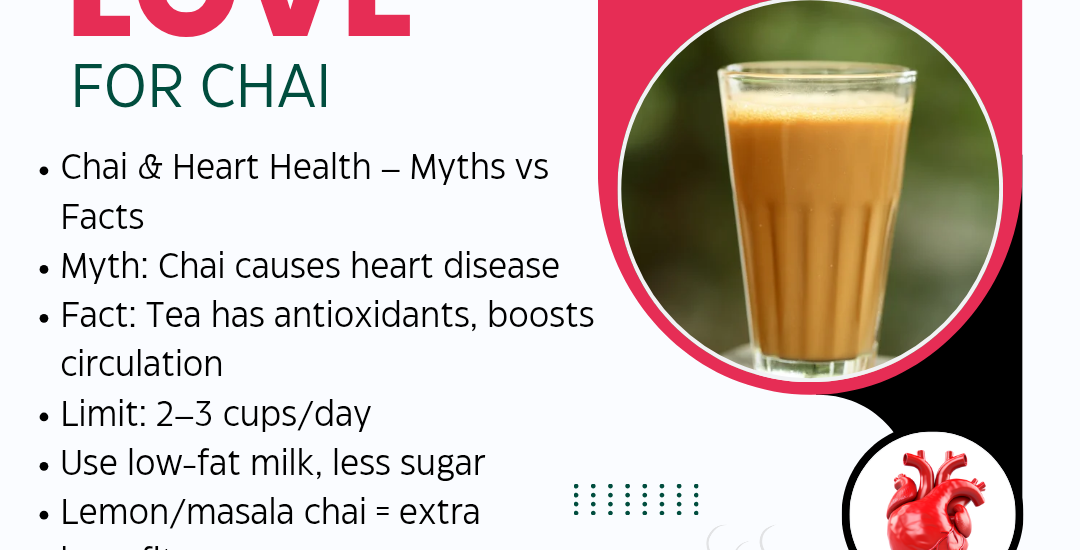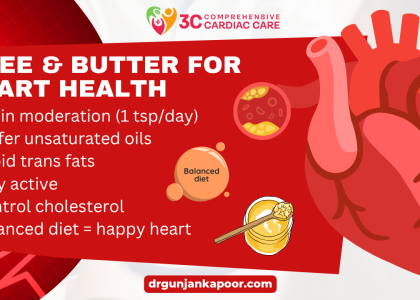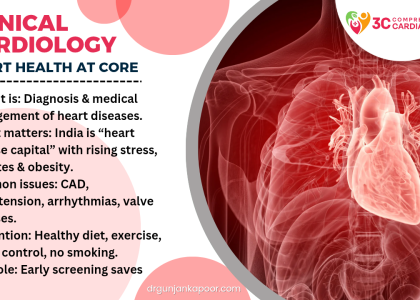Introduction
Chai is not just a beverage in India—it is an emotion, a tradition, and a part of daily life. From roadside tapris to high-end cafés, millions of Indians start and end their day with a steaming cup of chai. But as heart disease becomes a leading cause of death in India, questions are being raised: Is chai good or bad for your heart?
There are countless myths surrounding tea and heart health. Some believe chai strengthens the heart, while others think it raises blood pressure and cholesterol. This blog clears the confusion by separating myths from scientific facts, so Indians can continue to enjoy their cup of chai responsibly.
Myth 1: “Chai Causes Heart Disease”
Fact: Chai by itself does not cause heart disease. In fact, tea leaves are rich in antioxidants like flavonoids, which improve blood circulation, reduce oxidative stress, and may lower the risk of heart attacks. However, the way we prepare chai in India makes all the difference.
-
Too much sugar adds empty calories.
-
Full cream milk increases saturated fat intake.
-
Drinking chai multiple times a day with snacks like pakoras or biscuits may indirectly harm heart health.
So, the problem is not chai itself, but the extras we add to it.
Myth 2: “Black Tea and Green Tea Are Better Than Masala Chai”
Fact: Both black and green tea have proven heart benefits. Green tea, in particular, has more catechins that may help lower cholesterol. However, traditional masala chai with spices like ginger, cardamom, and cinnamon also carries health benefits. For instance:
-
Ginger improves digestion and reduces inflammation.
-
Cardamom may lower blood pressure.
-
Cinnamon helps regulate blood sugar.
So, masala chai can still be heart-friendly if consumed moderately and with less sugar.
Myth 3: “Cutting Chai Several Times a Day Keeps the Heart Strong”
Fact: Overconsumption of chai can backfire. Too much caffeine (present in tea) can:
-
Increase heart rate and blood pressure.
-
Disturb sleep, which indirectly affects heart health.
-
Cause acidity and dehydration.
The ideal limit is 2–3 cups a day. Beyond that, it may put stress on the cardiovascular system.
Myth 4: “Chai Helps Burn Fat and Prevents Heart Blockages”
Fact: Tea does boost metabolism slightly, but it is not a weight-loss miracle. Drinking chai will not “melt away” fat or unclog arteries. Heart blockages are caused by cholesterol deposits, high blood pressure, diabetes, and poor lifestyle—not chai.
However, replacing sugary soft drinks with unsweetened chai can be a healthier choice for the heart.
Myth 5: “Adding Lemon to Chai Improves Heart Health”
Fact: Adding lemon to black tea increases its vitamin C content and enhances antioxidant absorption. This may offer some heart-protective benefits. But lemon tea should not replace a balanced diet, regular exercise, or prescribed heart medications.
Chai & Indian Lifestyle: Striking the Balance
India’s obsession with chai is unlikely to fade—and it doesn’t need to. The key lies in healthy preparation and moderation.
Tips for Heart-Healthy Chai in India:
-
Reduce Sugar – Use jaggery, honey, or drink unsweetened chai.
-
Choose Low-Fat Milk – Skimmed milk cuts down saturated fats.
-
Limit Frequency – Stick to 2–3 cups a day.
-
Avoid Oily Snacks – Pair chai with fruits, nuts, or roasted snacks.
-
Experiment with Herbal Additions – Tulsi, ginger, cinnamon, and cardamom not only enhance flavor but also aid heart health.
Conclusion
Chai is deeply woven into India’s cultural fabric and does not need to be sacrificed for a healthy heart. The real challenge lies in moderation and mindful preparation. A cup of chai, especially when made with less sugar and low-fat milk, can be enjoyed guilt-free.
So, the truth is: Chai is neither a villain nor a miracle drink for the heart. It can support heart health when balanced with a nutritious diet, regular exercise, and medical guidance.
n not only win the trust of Gen Z but also secure their loyalty for the future.









